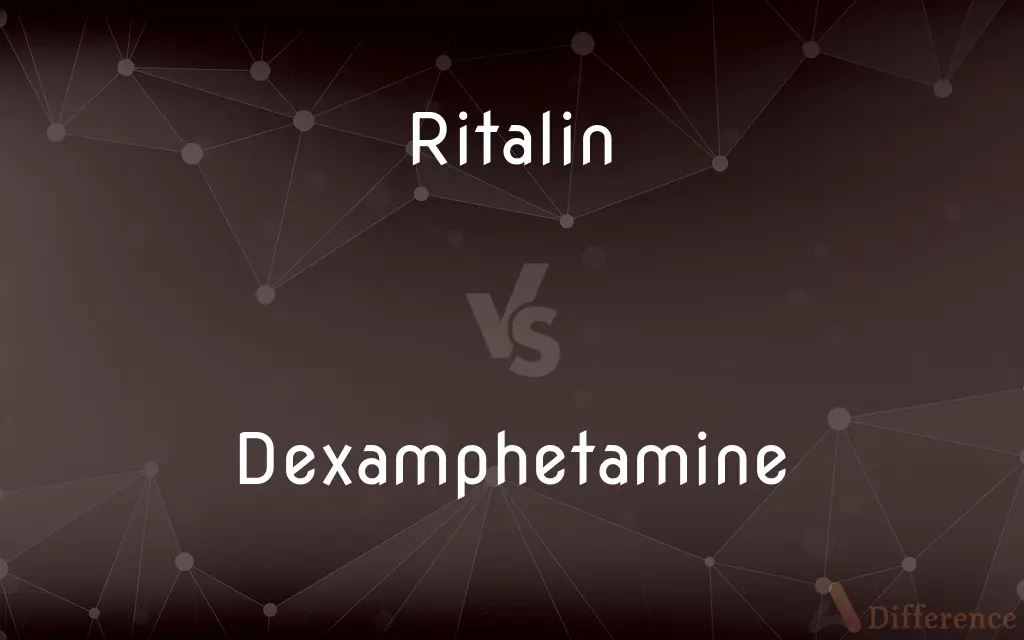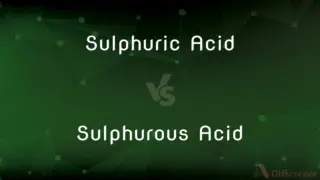Ritalin vs. Dexamphetamine — What's the Difference?
By Tayyaba Rehman & Urooj Arif — Published on February 24, 2024
Ritalin is a stimulant commonly used to treat ADHD and narcolepsy, focusing on dopamine and norepinephrine reuptake inhibition. Dexamphetamine, a form of amphetamine, targets the same neurotransmitters but with a stronger emphasis on releasing them.

Difference Between Ritalin and Dexamphetamine
Table of Contents
ADVERTISEMENT
Key Differences
Ritalin and dexamphetamine are both central nervous system stimulants prescribed primarily for Attention Deficit Hyperactivity Disorder (ADHD) and narcolepsy. Ritalin, the trade name for methylphenidate, works by blocking the reuptake of dopamine and norepinephrine into neurons, increasing the concentration of these neurotransmitters in the space between neurons (synaptic cleft). This action helps improve attention and focus while reducing hyperactivity and impulsivity in individuals with ADHD.
Dexamphetamine, part of the amphetamine class, not only blocks the reuptake of these neurotransmitters but also increases their release within the brain. This mechanism can lead to a more pronounced effect on alertness, attention, and energy levels, making it effective for treating ADHD. However, this also means that dexamphetamine has a higher potential for abuse and dependency compared to Ritalin, as its effects on the reward system of the brain are more significant.
The side effects of Ritalin and dexamphetamine can overlap, including insomnia, decreased appetite, weight loss, and mood changes. However, the intensity and occurrence of these side effects can vary between individuals, partly due to the differences in their action mechanisms. Dexamphetamine's more potent effect on neurotransmitter release can sometimes result in a higher incidence of side effects related to overstimulation, such as anxiety or jitteriness.
In terms of prescription, the choice between Ritalin and dexamphetamine is often based on the individual's response to the medication, side effect profile, and the potential for abuse. Some individuals may respond better to one medication over the other, necessitating a trial period under medical supervision to determine the most effective treatment with the fewest side effects.
Both medications are considered effective for managing ADHD symptoms, but they require careful monitoring by healthcare professionals to minimize the risk of side effects and dependency. The decision to use Ritalin or dexamphetamine will depend on the patient's medical history, symptom profile, and lifestyle, among other factors.
ADVERTISEMENT
Comparison Chart
Mechanism of Action
Blocks the reuptake of dopamine and norepinephrine
Increases the release of dopamine and norepinephrine, and blocks their reuptake
Primary Use
ADHD, Narcolepsy
ADHD, Narcolepsy
Potential for Abuse
Lower compared to dexamphetamine
Higher due to its stronger effect on neurotransmitter release
Common Side Effects
Insomnia, decreased appetite, anxiety
Insomnia, decreased appetite, anxiety, increased heart rate
Duration of Effect
Short to intermediate acting (3-4 hours for immediate release)
Longer acting compared to Ritalin
Compare with Definitions
Ritalin
A stimulant that increases attention.
Ritalin can help a student with ADHD focus on their homework.
Dexamphetamine
A potent stimulant for ADHD.
Dexamphetamine can significantly improve concentration in adults with ADHD.
Ritalin
Can cause decreased appetite.
A child on Ritalin might eat less at meals.
Dexamphetamine
May lead to weight loss.
Individuals on dexamphetamine often experience reduced appetite.
Ritalin
Requires careful dosing.
Adjusting Ritalin dosage is crucial to minimize side effects.
Dexamphetamine
Has a higher potential for abuse.
The euphoric effect of dexamphetamine makes it more likely to be misused.
Ritalin
Used for narcolepsy.
Ritalin helps patients stay awake during the day.
Dexamphetamine
Also treats narcolepsy.
It helps reduce excessive daytime sleepiness.
Ritalin
Has a lower potential for abuse.
Ritalin is less likely to be misused compared to dexamphetamine.
Dexamphetamine
Can increase heart rate.
Patients may need monitoring for cardiovascular side effects.
Ritalin
(pharmaceutical drug) methylphenidate, used to treat attention deficit hyperactivity disorder
Dexamphetamine
Dextroamphetamine
Ritalin
Central nervous system stimulant (trade name Ritalin) used in the treatment of narcolepsy in adults and attention deficit disorder in children
Common Curiosities
Can Ritalin and dexamphetamine be taken together?
Typically, they are not taken together. A healthcare provider should determine the best treatment plan.
Are Ritalin and dexamphetamine addictive?
Both have the potential for abuse and dependence, hence they are controlled substances.
Can adults take Ritalin or dexamphetamine for ADHD?
Yes, both medications are prescribed to both children and adults with ADHD.
How quickly do Ritalin and dexamphetamine work?
Both medications typically begin working within 30 minutes to an hour after ingestion.
Can Ritalin or dexamphetamine cure ADHD?
No, both medications manage symptoms but do not cure ADHD.
Can these medications affect growth in children?
Long-term use of stimulants can potentially impact growth, so children's growth should be monitored during treatment.
How are Ritalin and dexamphetamine taken?
Both are available in oral formulations, including tablets and capsules, taken with or without food.
How do I know if Ritalin or dexamphetamine is better for me?
The choice between Ritalin and dexamphetamine should be made by a healthcare provider based on individual response and side effects.
Are there any non-stimulant alternatives for treating ADHD?
Yes, there are non-stimulant medications like atomoxetine and guanfacine.
Is it safe to drink alcohol while taking these medications?
Alcohol can interact with these medications, so it's best to avoid or limit consumption and discuss with a healthcare provider.
Are there any long-term side effects of Ritalin or dexamphetamine?
Long-term use can lead to tolerance, dependence, and potential cardiovascular effects, emphasizing the need for regular monitoring.
Can Ritalin or dexamphetamine lead to weight loss?
Yes, appetite suppression leading to weight loss is a common side effect of both medications.
Can lifestyle changes complement the use of Ritalin or dexamphetamine?
Yes, a healthy lifestyle, including a balanced diet, regular exercise, and adequate sleep, can enhance overall well-being and symptom management in ADHD.
Can Ritalin or dexamphetamine improve academic performance?
While they can improve focus and attention in individuals with ADHD, they are not designed to enhance academic performance in those without ADHD.
What should I do if I miss a dose?
If you miss a dose, take it as soon as possible, but skip it if it's too close to the next dose. Do not double up doses.
Share Your Discovery

Previous Comparison
Sulphuric Acid vs. Sulphurous Acid
Next Comparison
Roofing vs. CeilingAuthor Spotlight
Written by
Tayyaba RehmanTayyaba Rehman is a distinguished writer, currently serving as a primary contributor to askdifference.com. As a researcher in semantics and etymology, Tayyaba's passion for the complexity of languages and their distinctions has found a perfect home on the platform. Tayyaba delves into the intricacies of language, distinguishing between commonly confused words and phrases, thereby providing clarity for readers worldwide.
Co-written by
Urooj ArifUrooj is a skilled content writer at Ask Difference, known for her exceptional ability to simplify complex topics into engaging and informative content. With a passion for research and a flair for clear, concise writing, she consistently delivers articles that resonate with our diverse audience.
















































